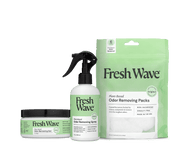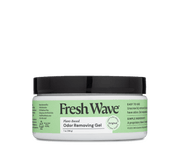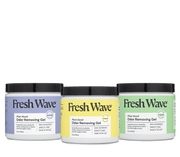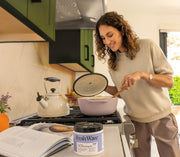A Beginner's Guide to Composting at Home (Without Annoying Odors)
So, you're curious about composting? You’ve heard that composting is great for your garden, good for the environment, and a wonderful way to reduce food waste. You may be asking: how do I get started composting? What’s the best way to compost at home? And through all your research, you may be wondering if your compost bin will stink up your kitchen and if it’s worth the extra hassle.
The short answer: yes. Without proper management, compost can smell bad. But with the right tools, tips, and techniques, composting can be an easy, enjoyable, and important habit. That's why we've created this beginner's guide to composting at home, without unwanted odors.
What is Composting? The Basics
Before we dive into odor control, let's first understand what composting is. Composting is the process of breaking down organic waste materials, such as food scraps, yard trimmings, and leaves, into nutrient-rich compost. It's a natural and environmentally friendly way to recycle organic waste and create a valuable soil amendment for your garden.
This process mimics nature's way of recycling, where microorganisms break down the waste, turning it into a dark, crumbly substance that can be used to improve soil health. Composting not only reduces waste sent to landfills but also provides a valuable resource for your garden, promoting healthy plant growth and reducing the need for chemical fertilizers.
Why Composting is Important: The Facts
Composting plays an important role in addressing the pressing environmental challenges of our time. According to the EPA, in the United States alone, over 30% of the total waste generated is organic matter, such as food waste and yard trimmings. Shockingly, the Food and Agriculture Organization (FAO) estimates that globally, about one-third of all food produced for human consumption, roughly 1.3 billion metric tons, is lost or wasted every year.
When this food waste ends up in landfills, there isn’t enough space and oxygen for it to break down naturally. This means it decomposes anaerobically, without oxygen, leading to the production of methane, a potent greenhouse gas that significantly impacts our atmosphere.
Composting, on the other hand, allows organic materials to break down aerobically, releasing fewer greenhouse gases and producing nutrient-rich soil that can enhance agricultural productivity.
By diverting food waste from landfills and encouraging composting, we not only reduce methane emissions but also promote sustainable soil practices, conserving resources and fostering a more resilient and circular approach to managing our waste.
Everything You Need to Start Composting in 6 Steps
1. Choose a Composting Method:
- Backyard Composting: If you have outdoor space, consider using a compost bin, pile, or tumbler.
- Indoor Composting: For apartment or urban living, select a compact composting system like a worm bin or bokashi bucket.
2. Gather Compostable Materials:
- Collect kitchen scraps like fruit and vegetable peels, coffee grounds, and eggshells.
- Include yard waste like leaves, grass clippings, and small branches.
3. Choose Your Container:
- For indoor composting, get a small container with a lid to store kitchen scraps temporarily before taking them to your community garden or having them picked up by a compost service.
- Choose a compost bin or container suited to your chosen outdoor composting method.
4. Start Composting:
- Layer your compost materials, mixing "green" (nitrogen-rich) and "brown" (carbon-rich) materials for optimal decomposition. This will also prevent strong odors from developing.
- Turn or aerate the compost regularly to promote decomposition.
5. Manage Compost Odors with Fresh Wave:
- Use Fresh Wave products to prevent odors in your composting area.
- Keep a Fresh Wave Gel near your indoor compost bin to absorb odors 24/7.
- After emptying your compost bucket into your outdoor composter, wash the container with soap and warm water, then spray with Fresh Wave Spray to remove any lingering odors. Allow it to dry completely before adding more compost.
- For indoor composting, seal the container tightly and empty it regularly (we recommend daily) to minimize smells.
6. Add Your Compost to the Garden:
- Depending on your composting conditions, you could have ready-to-use compost in a few months. To know if your compost is ready to be used in the garden, look for signs like a dark, crumbly texture, a pleasant earthy smell, and the absence of recognizable original materials. Once it's ready, you can add it into garden beds, pots, and planting containers to amend the soil and encourage plant growth.
- You don't have to live on a farm or have a big backyard to get started composting! Apartment-dwellers can connect with community gardens to contribute compost or join communal composting efforts.
- Look for local compost pick-up services that collect compostable materials directly from your home.
Why Does My Compost Stink?
Experiencing unpleasant odors in your compost pile can be disheartening, but it's a common issue with various potential causes. Foul smells can arise from improper composting practices and imbalances within the pile. One reason for the odor could be an excessive amount of "green" materials, such as food scraps and fresh grass clippings, without an adequate balance of "brown" materials like leaves and cardboard. This imbalance can lead to a lack of proper aeration and cause anaerobic decomposition, which produces foul-smelling compounds like hydrogen sulfide.
Additionally, if the compost pile is too wet or waterlogged, it can inhibit oxygen flow and promote the growth of odor-causing bacteria. Finally, adding non-compostable items like meat, dairy, or oily foods can create a breeding ground for pests, causing both odors and unwanted critters.
Preventing Compost Odors
Thankfully, there are several effective strategies to prevent and mitigate compost odors, ensuring your composting experience remains pleasant and productive.
- The Proper Green-to-Brown Ratio: First and foremost, maintaining the right balance between "green" and "brown" materials is crucial. Aim for a mix of roughly two-thirds "brown" materials to one-third "green" materials by volume.
- Turning Compost Often: Regularly turning or aerating the compost pile helps introduce oxygen and encourage aerobic decomposition, which minimizes foul odors associated with anaerobic processes.
- Managing Moisture: Ensuring proper moisture levels is equally important – your compost pile should be damp, similar to a wrung-out sponge, but not overly wet. Covering your compost with a lid or tarp can help regulate moisture and keep pests out.
- Using Natural Odor Removers: If you're composting indoors or in a confined space, consider using Fresh Wave products designed to neutralize odors, keeping your living area smelling fresh.
- Knowing What You Can't Compost: There are certain items you should avoid putting in your compost pile to ensure the best results and to prevent issues like odors or attracting pests. We list twelve of them below.
By practicing these methods and avoiding materials that contribute to odor issues, you can enjoy the benefits of composting without the accompanying unpleasant smells.
12 Things You Shouldn't Put in Your Compost
Here's a list of things you shouldn't add to your compost to make sure it breaks down properly and doesn't create rancid odors:
- Meat and Dairy Products: These items can attract pests and lead to unpleasant odors. Avoid adding meat, bones, fish, cheese, and other dairy products.
- Oily and Greasy Foods: Cooking oils and greasy foods can slow down the composting process and create a slimy environment.
- Processed Foods: Processed foods may contain preservatives or additives that don't break down well in compost and can attract pests.
- Diseased Plants: Plants infected with diseases or pests should not be composted, as this can spread the problems to your garden when you use the finished compost.
- Weeds with Seeds: Weeds that have gone to seed may sprout in your compost, causing more work in your garden later.
- Large Branches or Woody Material: These take longer to break down. It's best to chop them into smaller pieces before adding them to your compost.
- Pet Waste: Pet waste can contain harmful pathogens that don't break down well in home compost systems.
- Plastics and Non-Biodegradable Materials: These materials don't break down and can contaminate your compost.
- Treated Wood or Sawdust: These can contain chemicals that you don't want in your garden.
- Coal Ash or Charcoal: These materials can contain harmful substances.
- Metal or Glass: These don't break down and can be dangerous in the garden.
- Large Quantities of Citrus: While some citrus peels are fine, too many can make your compost too acidic.
In Conclusion: Composting Doesn't Have to Stink
In essence, managing your compost is much like managing a trash can in your kitchen—it's all about balance, proper techniques, and the right tools to prevent unwanted odors. Just as you wouldn't allow your kitchen waste to accumulate and emit unpleasant smells, maintaining a compost pile with care can lead to an odor-free and enriching experience. By starting a well-rounded composting routine, you can harness the power of natural processes to create nutrient-rich soil while keeping your surroundings fresh and inviting.
With the right techniques, tools like Fresh Wave products to conquer odors, and a dash of dedication, composting can effortlessly become a fulfilling and environmentally responsible part of your everyday life.
So where are you in your composting journey? Let us know in the comments below by dropping an emoji or sharing your answer!
🤔 I’ve never composted before but I’m curious to try
🌱 I’ve composted before and I’m still learning
💪 I’m a compost pro!









